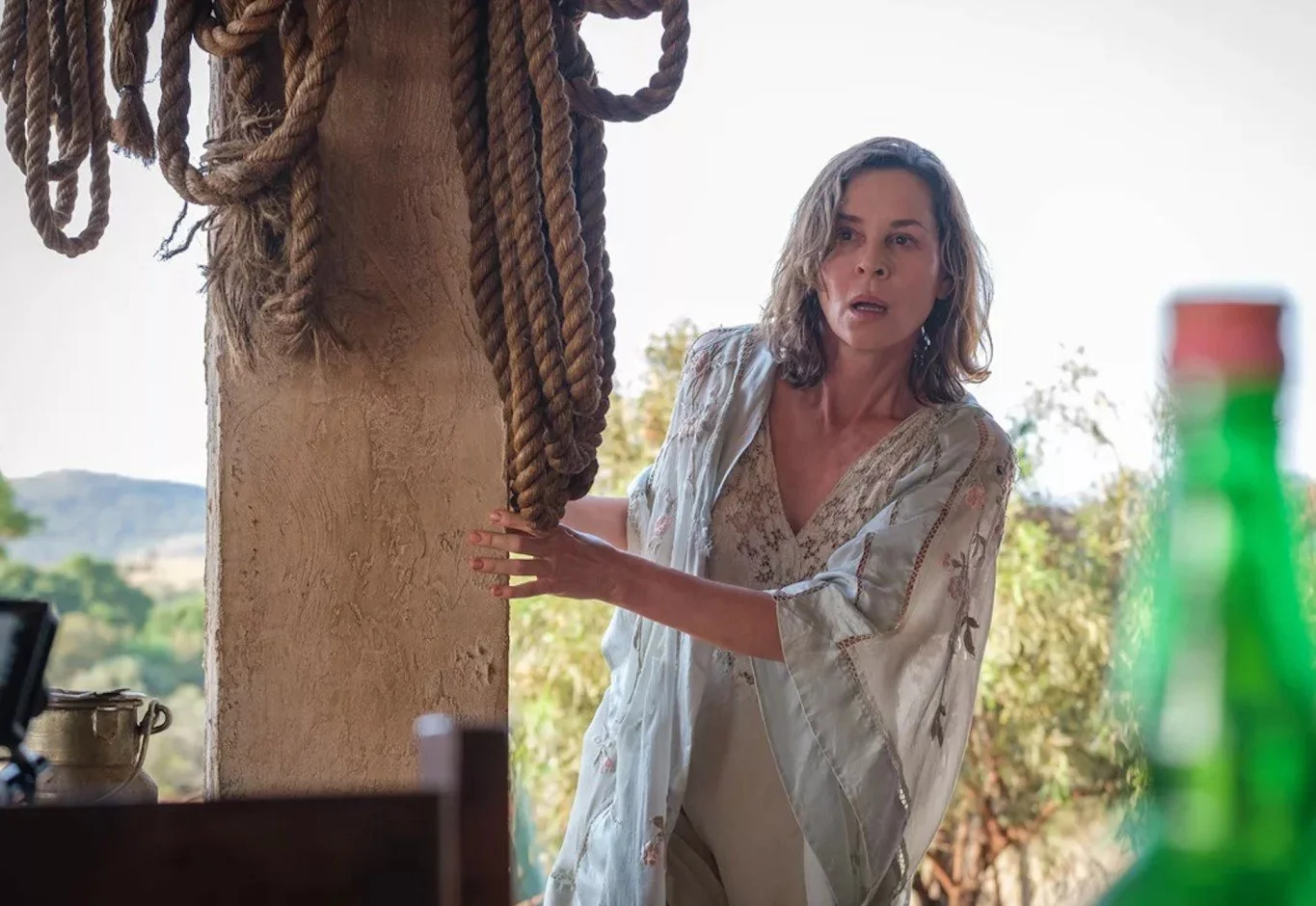Directed by: Embeth Davidtz
Written by: Embeth Davidtz, based on Alexandra Fuller’s memoir
Starring: Embeth Davidtz, Lexi Venter, Zikhona Bali, Fumani Shilubana, Anina Reed, and Rob van Vuuren
Runtime: 98 minutes
‘Don’t Let’s Go to the Dogs Tonight’ is an enlightening time capsule captured during the aftermath of the Rhodesian Bush War
A few canines appear in director/writer Embeth Davidtz’s feature film debut, and the four-legged friends lounge in a living room and on the porch of a family farm set in Rhodesia (or named Southern Rhodesia, Zimbabwe Rhodesia, or Zimbabwe, depending on the time) during a hot 1980 summer. The dogs observe the Fuller family, led by Tim (Rob van Vuuren) and Nicola (Davidtz), and their two daughters, teenager Vanessa (Anina Reed) and 8-year-old Bobo (Lexi Venter). However, the movie is led by the youngest Fuller, Alexandra, also known as Bobo.
Alexandra wrote her memoir, with the same title as the film adaptation, in 2001. In celluloid, Venter, 7, bravely (or perhaps without a care in the world) carries “Don’t Let’s Go to the Dogs Tonight” – with a marvelous performance - in a small setting where sweeping national changes ensue, and Bobo and moviegoers witness their effect in this household.
Davidtz – who grew up in nearby South Africa and directs, writes, and stars as a passion project – captures Alexandra’s subjective childhood thoughts through Lexi, as the child actress gazes at the world through Bobo’s eyes and offers extensive emotional ranges.
Racial tensions and the end of the Rhodesian Bush War linger over and throughout the house like a 100,000-pound slab of chromite, and the broader quagmire, which we don’t witness on-screen, turns Nicola into a day drinker and an irritated command sergeant of her home, barking orders and showing little patience.
Bobo briefly explains why her mom is this way, and the reason deals with a painful loss. Her father is often jettisoned away to fight “terrorists”, so Bobo usually turns to Sarah (Zikhona Bali), the Fullers’ maid, for comfort, conversation, diversion, and direction. They care for one another, but Jacob (Fumani Shilubana), a worker on-site, regularly interjects during Bobo’s transgressions, effectively depicting a microcosm of the larger division between Blacks and whites.
Alexandra loiters around the farm, wanders into her parents’ bedroom, sits in grassy and dirt fields in her bare feet, zips along on her recreational motorbike, or hangs with other children outside a local pub while their parents drink the night away.
Cinematographer Willie Nel films the days’ events from Bobo’s perspective, depicting them close and at her height, like during an awkward visit to her grandparents’ home, where Grandad mumbles and struggles with incontinence. Bobo opines that her grandpa doesn’t speak anymore, and “he makes some strange sounds.” She also travels with her mom to her place of work outside the farm. Nicola is a police officer, and Bobo carefully walks up to a weathered but secure door with a horizontal slot (that’s cut for a food tray), looks inside, and sees a Black prisoner looking back at her.
At home, she’ll gaze out at the surrounding brush and say, “I keep a lookout for terrorists.”
Davidtz establishes the possibility of the violence setting foot on the Fullers’ farm but under a backdrop of ordinary events, like serving tea, hanging damp clothes on a line, or in Nicola’s case, waking up, seeing a snake in the kitchen, and firing bullets from a machine gun to kill it.
“Sorry about the mess,” Nicola says.
In terms of pacing, the 98-minute runtime feels longer, as “Dogs” doesn’t choose to land very often with explosive moments, like machine gun pest control. Instead, it moves from one random scene to another with a larger purpose that is not easily discernible with just one viewing. However, during this one viewing, it largely works as a time capsule to enlighten moviegoers with life during this time and place for average white and Black Rhodesians, which is, at times, accompanied by a catchy 70s soundtrack, including a song from one of (nearby) South Africa’s favorite musicians, Sixto Rodriguez.
The film might jog memories from your childhood, as you may have listened to adults converse over stressful events from recent history while the TV in the room features them, like the Civil Rights Movement, the Vietnam War, 9/11, or in this critic’s case, 70s inflation and the Iran Hostage Crisis.
For Bobo, she interprets the lingering trauma – the best an 8-year-old can - around her while attempting to go about her daily routines and stumbling into arbitrary happenings. Amid the heat and racial divides, she’ll occasionally try to conjure childhood magic.
“Don’t Let’s Go to the Dogs Tonight” might not be magic, but we begin to understand the men and women living behind this Rhodesia/Zimbabwe curtain.
Jeff’s ranking
2.5/4 stars















